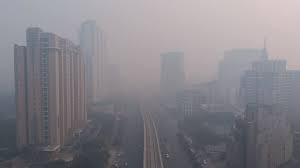In response to escalating concerns about air pollution in cities, the government has launched an ambitious Urban Air Quality Initiative. This program aims to address the rising pollution levels affecting the health and well-being of urban residents. By implementing a series of strategic measures, the initiative seeks to create cleaner, healthier air in our cities.
Understanding the Pollution Challenge
Air pollution poses significant risks to public health, leading to respiratory diseases, heart conditions, and other serious health issues. Urban areas, with their dense populations and heavy traffic, often experience the worst pollution levels. Here’s why this initiative is critical:
- Health Impacts
Poor air quality can lead to long-term health problems. Children, the elderly, and those with pre-existing health conditions are particularly vulnerable. By improving air quality, the initiative aims to protect the most at-risk populations. - Environmental Consequences
Air pollution contributes to climate change and can harm ecosystems. Pollutants can damage plants, water sources, and wildlife, disrupting natural balances. Cleaner air means healthier environments for all living beings. - Economic Burden
The health impacts of air pollution can lead to increased healthcare costs and reduced productivity. By investing in cleaner air, the initiative could save cities money in the long run and improve overall economic health.
Key Components of the Initiative
The Urban Air Quality Initiative includes several comprehensive strategies to tackle pollution effectively:
- Enhanced Monitoring Systems
The program will establish advanced air quality monitoring systems throughout urban areas. These systems will provide real-time data on pollution levels, allowing authorities to respond swiftly to deteriorating air quality. - Emission Reduction Targets
The initiative sets clear targets for reducing emissions from vehicles, factories, and other sources. Stricter regulations will be enforced to ensure compliance and encourage the adoption of cleaner technologies. - Promotion of Public Transportation
To reduce the number of vehicles on the road, the initiative will promote the use of public transportation. Improved transit systems, including buses and trains, will make it easier for residents to choose eco-friendly travel options. - Green Infrastructure Development
The initiative emphasizes the importance of green spaces in urban areas. Parks, green roofs, and urban gardens not only improve air quality but also enhance community well-being. These spaces can help absorb pollutants and provide clean air. - Community Engagement and Education
Engaging local communities is crucial for the success of the initiative. Educational programs will inform residents about the sources and effects of air pollution, empowering them to take action and advocate for cleaner air.
Expected Benefits of the Initiative
The Urban Air Quality Initiative is expected to bring several positive changes to urban environments:
- Improved Public Health
With cleaner air, residents can expect to see a decrease in respiratory illnesses and other health problems associated with pollution. This leads to a healthier population and improved quality of life. - Enhanced Environmental Quality
Reducing pollution levels will contribute to healthier ecosystems, supporting biodiversity and improving the overall environment in urban areas. - Economic Growth
A healthier population means increased productivity. Moreover, investing in green technologies and infrastructure can create jobs and stimulate local economies. - Stronger Community Resilience
By involving communities in the initiative, residents will feel empowered to take action. This collective effort can lead to stronger, more resilient neighborhoods that prioritize sustainability.
Conclusion
The launch of the Urban Air Quality Initiative marks a critical step in the fight against pollution in our cities. By focusing on monitoring, regulation, public transportation, green infrastructure, and community engagement, this initiative aims to create cleaner, healthier urban environments for all residents.
As cities continue to grow, addressing air quality becomes increasingly important. Through dedicated efforts and collaboration among government agencies, communities, and individuals, we can combat pollution and build a sustainable future.
With cleaner air, we not only enhance public health but also foster vibrant, thriving communities. The Urban Air Quality Initiative is an opportunity to reclaim our urban spaces and ensure a healthier, more sustainable environment for generations to come.


